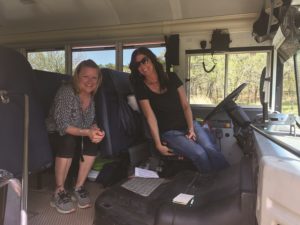TRURO — Perched on the driver’s seat of a 2009 Blue Bird front-engine school bus, Julie Packard checks the lights, dials, and gauges of her rig. Packard, who has been driving for Truro Central School for 10 years, said she makes these checks before every morning route and after each afternoon trip.
Fellow driver Vickie Diamond, who has also been driving for 10 years, joined Packard on May 17 for an on-board interview. Diamond, who lives in Wellfleet, and Packard, from Eastham, each have about a dozen students on their routes, and they enjoy greeting each one by name and cheering them up when they seem glum on weekday mornings.

These final days of the school year will be Diamond’s last as a driver for the district. She’s planning to return to her home state of Montana. Her absence will be felt not only by the students on her bus but also by the school district and the Cape Cod Collaborative — the membership organization that has provided bus services for Truro since 2008 and for the Nauset Regional Schools since 2019.
There has been a shortage of bus drivers on the Cape for over two years, said Paul Hilton, executive director of the collaborative. His staff of 40-some drivers dropped by 20 percent at the beginning of the pandemic, he said, and has not rebounded. Part of that has been due to the virus itself. Even now, Hilton said, “Not a day goes by that somebody’s not sick and out of work.”
The job pays relatively well. Hilton said they’re now paying drivers $29 an hour. For roughly 30 percent of them, driving is a second job, he estimates. The collaborative will also pay for a new driver’s 60 required training hours and offers $1,000 bonuses after the first month and first year of employment. Still, Hilton is not optimistic about overcoming the staff shortage.
“I think, with the pandemic, staffing is going to be an ongoing challenge for the foreseeable future,” Hilton said. The lack of young residents on the Cape is also a growing concern, he said, and not just for his organization. He estimated the average age of the collaborative’s drivers to be in the late 50s.
He used to see more young applicants, and those hired would stay in their jobs for many years. But now, he said, “People are re-evaluating what they want to do. Particularly in this region, that’s exacerbated by property values that have gone up so significantly that people are choosing to sell their properties and move elsewhere. The people who can afford to come to the Cape may not make the choice to drive a bus.”
Packard, whose husband is a lobsterman, starts at 7 a.m. in Provincetown, and Diamond begins her route at the Wellfleet Drive-In.
Their 45-minute routes don’t change a lot, they said. But they try to keep their route sheets up to date in case they ever need to miss a day because they know “being a substitute driver is really hard,” Diamond said.
In Yarmouth, drivers are doubling up on bus routes, Packard said, and mechanics and dispatchers — anyone with a commercial driver’s license — are also driving.
“It’s strange to see your boss driving,” Diamond said.
Diamond enjoys working with elementary school-aged children. “They are at a precious age,” she said, and though “it’s heartbreaking to watch the kids grow up and leave,” every time she sees a pregnant woman she thinks “job security!”
By the time her charges are in sixth grade, Diamond admitted, she is “ready to see them go.” That’s when, even though the students are in assigned seats and without their electronic devices, they can get a little “fresh.” It sometimes takes work to keep unruly kids under control, Packard admitted.
Diamond does that work for the Monomoy district, where she doubles as a bus monitor. Those posts are also “of course,” she said, “understaffed.”



